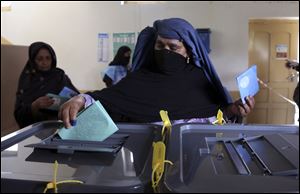
EDITORIAL
Afghanistan’s vote
4/8/2014
An Afghan woman casts her vote at a polling station in Jalalabad last Saturday.
That an estimated 60 percent of 12 million eligible voters in Afghanistan faced down Taliban threats and cast ballots in Saturday’s presidential election is good news, suggesting civic resilience, a certain faith in democratic processes, and a maturing political system in a war-torn country. It is a further sign that the time has come to end America’s combat role there after 13 years of conflict.
For months, the Taliban threatened to disrupt the election, and in recent weeks, it looked as if they would succeed. Ahead of the voting, there were a number of despicable high-profile attacks, including on a voter registration center, the election commission headquarters, and Kabul’s only luxury hotel.
But limited violence on Election Day and high voter turnout (if unofficial returns prove accurate), suggest the Taliban’s anti-Western, fundamentalist appeal is seriously waning.
Drawing quick conclusions about Afghanistan is always risky, but it appears that Afghan security forces, which the United States and the North Atlantic Treaty Organization built and trained over the past decade, made a major contribution to the reasonably peaceful outcome. More than 350,000 military and police units were deployed for the vote.
For the first time, Afghans had the primary responsibility for their own election security and for delivering ballots to nearly 400 district locations, with American forces playing a subsidiary role. In the past, Pentagon and State Department investigators have found serious weaknesses in the Afghan forces, and many problems persist.
But the election suggests the Afghans are improving to a point where they can soon stand on their own in defending the country. The United States should withdraw its remaining 34,000 troops from Afghanistan as soon as practical.
The counting of ballots and the election process is far from over, and there is a dangerous potential for violence. It appears from early returns that no candidate got a majority of the vote.
That means the two highest vote-getters — as of now, they seem to be Abdullah Abdullah, a former foreign minister, and Ashraf Ghani, a former official at the World Bank — will be in a runoff sometime in May. Given the nature of Afghanistan’s tribal and ethnic political makeup, it could be months before a president is finally chosen.
Afghans should seek to complete the process promptly. Then they can get on with putting the country’s relations with the West and its neighbors on a firmer footing, focused on institution-building and economic development.
— New York Times